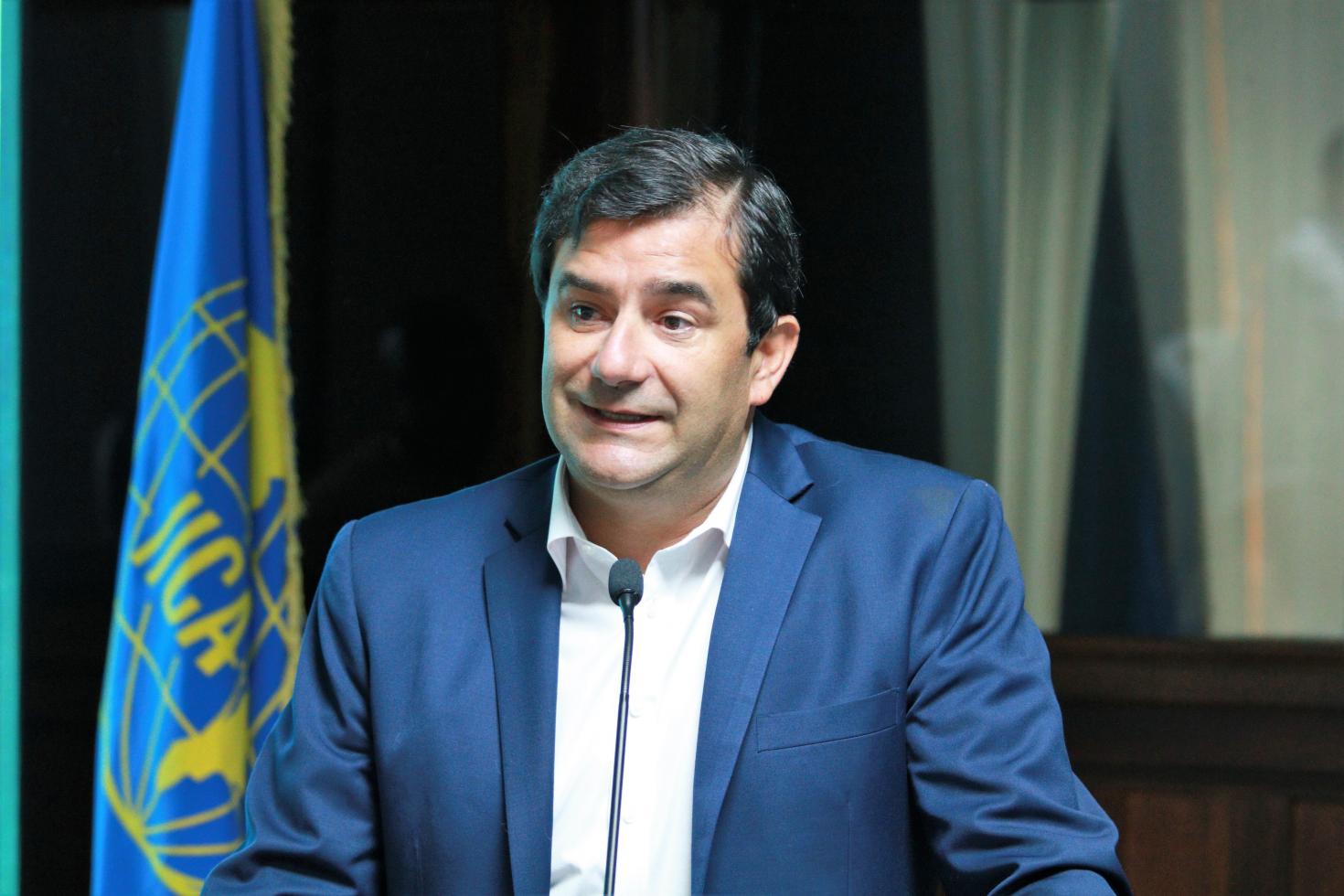Today, the technological company and the Inter-American Institute for Cooperation on Agriculture formalized a strategic relationship to facilitate the implementation of the Internet of Things, Big Data and Artificial Intelligence in the agriculture sector of the Americas.

San José, Costa Rica, 31 October 2018 (IICA). Manuel Otero, Director General of the Inter-American Institute for Cooperation on Agriculture and César Cernuda, President of Microsoft Latin America and Corporate Vice-President of Microsoft Corporation, signed an agreement today that will foster the development and application of technological tools in the hemisphere’s agriculture sector, as a means of bolstering the digital transformation of the sector.
The two-year agreement, entitled Digital Educational Partnership, was signed at IICA’s Headquarters in San José, Costa Rica and will facilitate cooperation in areas such as development of the requisite technological solutions for agriculture in the Americas; the introduction of Internet of Things (IoT), Big Data and Artificial Intelligence (AI) tools, as well as the application of innovation and information and communication technologies in development projects, among others.
The purpose of the agreement, which is a springboard for implementing many initiatives within the area of agricultural digitalization, is to use Microsoft’s extensive technological platform to address the critical innovation needs within the value chain of stakeholders and in the ecosystem of the agriculture sector.
IICA’s Director General remarked that, “We need to quickly bridge the digital divide, which calls on us to be innovative and to modernize IICA’s technical cooperation efforts. It is therefore imperative that we exploit the full potential of information and communication technologies. That is why IICA considers Microsoft to be a strategic partner, with which we can develop joint projects and solutions to benefit agriculture in the Americas”.
Otero stressed the importance of adopting and using technologies to “improve the decision-making of stakeholders and to streamline processes and choices, such as what, how, how much and what to produce and even how to market and sell the final good or service”. He also highlighted technology’s role “in strengthening and empowering young people and rural women”.
The Internet of Things, Big Data, Artificial Intelligence, blockchain – to mention just a few – will prove essential in digitalizing agriculture and in ensuring its evolution into a more intelligent sector. Agriculture is the basis of human existence and therefore it should no longer rely on traditional solutions. It should be innovative, intelligent, more productive, profitable, and also sustainable. This can only be achieved with the assistance of the ICT tools that are available today and those that are being developed with an eye to the future.
César Cernuda, President of Microsoft Latin America and Corporate Vice-President of this technological company remarked that, “At Microsoft we are confident that research and innovation in the agriculture sector is one of the most critical elements in the fight against world poverty. That is why we are continually developing agricultural products with a view to creating a sustainable, clean system, which also reduces the level of food waste on the planet”.
The use of technology in agriculture facilitates the gathering of information and helps to boost agricultural productivity, increase yields and reduce waste and the cost of inputs. If farmers have access to more information, they can correlate it to what they are observing in the field, which will give them a better understanding of what is taking place.

This synergy will also serve to empower young people and rural women with technological tools that should help to reduce the flight of this sector of the population to urban areas. Both organizations will also work together to preserve the cultural and historic legacy of agriculture in Latin America and the Caribbean, through the development of a virtual and interactive agricultural museum.
Microsoft has a wealth of experience in digital inclusion, especially in initiatives targeting young people and vulnerable populations. Through this partnership, both organizations will work to establish cloud platforms with state of the art technology to offer training solutions, virtual reality and the Internet of Things, to assist young people and women working in rural areas, in particular.
This is not the first time that IICA and Microsoft have collaborated. Some months ago, both institutions embarked on a process to develop Internet of Things and Artificial Intelligence prototypes, for the purpose of tackling diseases in coffee cultivation, and they are also working on a platform to strengthen capacities in agriculture-related areas.
Microsoft also participated in a public-private sector discussion forum in July, which was organized by IICA, as part of the 38th Regular Meeting of its Executive Committee. There, Microsoft demonstrated how the implementation of drone and sensor technologies, precision agriculture, Big Data, the Internet of Things and Artificial Intelligence could be used to increase productivity and reduce production costs in the agriculture sector.
About Microsoft
Microsoft (Nasdaq “MSFT”@microsoft) enables digital transformation for the era of an intelligent cloud and an intelligent edge. Its mission is to empower every person and every organization on the planet to achieve more.
More information:
Emmanuel Picado, Head of Information and Communication Technologies and Digital Agriculture, IICA











